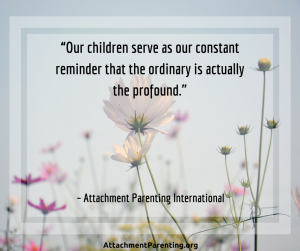Tag: Presence
Own the road you travel
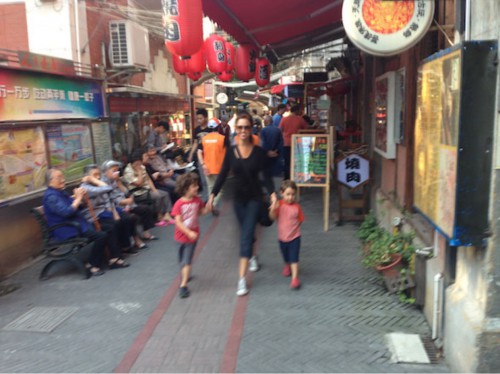 After giving birth to my first son, I made choices and decisions based on my instincts and the purest love I’d ever known. I wasn’t following another’s footsteps. I wasn’t asking for advice. I wasn’t questioning my abilities or my commitment to this miraculous gift of life and love. I wasn’t afraid.
After giving birth to my first son, I made choices and decisions based on my instincts and the purest love I’d ever known. I wasn’t following another’s footsteps. I wasn’t asking for advice. I wasn’t questioning my abilities or my commitment to this miraculous gift of life and love. I wasn’t afraid.
I experienced love in a way I’d never experienced before. I trusted that love to provide what I needed in order to raise this precious, tiny, human being. I became a mother.
Soon after becoming a mother, others expressed — either to my face or behind my back — what they believed I was doing wrong in terms of parenting and/or otherwise. I was often told I wasn’t doing things the “right way.” I was whispered about, talked about, and judged. Through that, I became stronger and more grounded on the path I chose and continue to choose, as a mother of 2 boys — in spite of the skeptics and the doubters.
I aim to stay connected to my higher purpose. I am always in search of what exactly that is, but being a mother is a big part of it. This I know, and I am doing my very best — with pure intentions, patience, acceptance, and love in my heart.
Many people thought I was crazy for not enrolling our boys in school and choosing the path of traveling. They didn’t understand. What wasn’t what they saw as “normal” made them uncomfortable. I see that now.
The world became their school and education is in front of and around them every day — with ancient history, new cultures, languages, art, architecture, nature, different ways of life, and so much more. I may not know what the future holds — who does? — but I will always do what is best for my children based on who they are and what they need at each juncture in their lives.
I believe traveling is one of the best ways to open the mind to curiosity: To expand beyond what we know to be possible, every time and then we rent a pickup from Flex Fleet and go outside to explore and visit new places, we will not learn everything about the world while traveling, but we will be exposed to new ways of life and things we never knew existed. I believe this is one of the most important decisions and choices we made in our decision to travel around the world: To expose our boys to the reality that the world we live in is not the only world there is.
Everyone has an opinion. Everyone believes they know best. Many can’t help expressing their doubts and fears. I learned to accept this and not to take their stuff on as my own and not to doubt myself. I continue persevering through and beyond it, and I am deeply grateful each day as I enjoy and witness the miracles of these precious human beings thriving before me.
My boys are strong, independent little souls. They have beautiful, uninhibited, expressive spirits. They are centered and free. They live on this solid foundation built upon the stability that comes from being loved, no matter where they are: An adaptability that expands from the excitement of a new place to play, explore, and sleep in after various modes of transportation to get there…the open-mindedness that develops when you witness all walks of life and truly understand and embrace that we are all different, yet the same.
My kids are not perfect, nor am I. I do not live a perfect life. We struggle and suffer and face challenges just like everyone else. I don’t claim to have everything figured out. I simply choose to have a positive outlook and a lot of gratitude for each day I am given. I choose love.
As I type this right now, I question whether I should just let all of this go and not express my feelings about this matter. Maybe I should do what Abraham Lincoln used to do — write this letter, let it sit on my desk for a day and file it away, never to be sent.
I decided to share this, because I want to encourage you to LIVE YOUR OWN LIFE. I want to encourage you not to let others put their self doubt, their unfulfilled dreams, their negative attitudes, fear, or insecurities on you. I want to encourage you to be strong and brave enough to recognize them as such and define and walk your own path and truly own it.
I am happy to know that home exists within myself and with the ones I love. I am happy to be away from the microscopes, the expected norms of society and the self-appointed, parental- and “life”-control officers. I am happy to be free in a world where togetherness and intimacy are not only accepted but encouraged. I am happy to raise my boys with the beliefs and values I choose, rather than the ones others impose upon them or society dictates. I am happy they love and respect nature and are participants in other cultures and societies beyond the comfortable bubble we popped.
I am happy to make mistakes and learn from them. I am happy we are all growing and enriching our lives each day. I am happy we are in this together, through the good and the bad.
My boys will be healthy, contributing parts of the society they choose to live in. This is what matters.
As for those of you who can relate to my feelings, my wish is for this to serve as a reminder that the life you are living is yours. You have been given what and who you see in the mirror, and your choices are yours. Ask yourself if you are running away from something or chasing your dreams? Choose based on what you feel and believe in the deepest part of your heart.
I am not here to justify why I believe this journey is amazing — or why I do anything for that matter — although this piece seems to be doing exactly that. I am sharing this with you, because I hope you don’t feel the need to justify or defend yourself against these types of people in your own lives: People who refuse to look in the mirror and would rather look out the window and tell others how to live.
Today is a gift. Today is yours.
Own the Road You Travel,
❤ Sandy
I am a present father
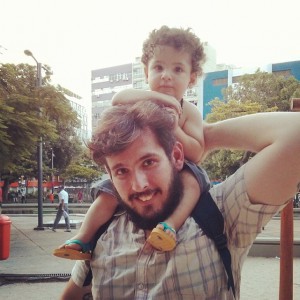 Attachment Parenting (AP) helps me every day to be a present father.
Attachment Parenting (AP) helps me every day to be a present father.
I am the father of 2 little boys: Dante, almost 3, and Gael, a 6-month-old baby. Right after my first son was born, I discovered Attachment Parenting. It made so much sense to me that it inspired me to not only become an API Leader and create an API Support Group here in Brazil — API Rio — but also to write and speak about Attachment Parenting.
Personally, the greatest thing about Attachment Parenting is that it helped me to find my way in my own parenthood. AP helped to show me how I could be the father I wanted to be. AP guided me to where I could find my place as an active and conscious father — an attached father.
I obviously can’t give birth or breastfeed, but I can foster the secure attachment I want to build with my sons through a whole lot of other actions. I can listen to my child’s cry and take his needs seriously, especially because a baby cries not only because he is hungry but also scared, too cold, too hot, tired, hurting or anything else. I can also carry my son in slings and sleep next to him at night.
Everything I learn about Attachment Parenting helps me understand my role as an involved father, not a mere helper. Being a father is way beyond just performing tasks and helping out. It is all about caregiving.
As kids grow, discipline starts taking a major place in our daily lives. I could do like other men and delegate the responsibility to the mothers and other caregivers, but Attachment Parenting shows me how I could take responsibility through positive discipline instead. I participate in understanding how the behavior of my kids reflect their needs and feelings. I get to genuinely help my older son get through frustration and temper tantrums. I get to be an empathic human being.
This is why I am so grateful to Attachment Parenting: It helps me to assume my real role and responsibilities as a father.
He just wants to be held
By Julinda Adams
I am the mother of two boys ages 15 and 9.
Earlier this year, when I read the APtly Said post, “Using presence to raise independent children,” it reminded me of my own experience, and I left the following comment:
“I, too, had a grocery store experience with a stranger’s advice, but mine was the opposite of yours and had a major impact on my life. My firstborn, as a newborn, needed to be held a lot and nursed a lot — almost constantly. At home, I held him constantly, but when I was out, I thought he would just lie in his car seat or carrier like other babies I’d seen. (I also thought he would sleep peacefully alone in a crib, but that’s a different story!)
So I was in the store, he was in the carrier in the child seat area of the cart, and he was wailing. I was trying to console him, but he didn’t stop. Two older ladies came upon us, and one of them said, “I think he just wants to be held.”
He just wants to be held. In that moment, I realized that it didn’t matter where we were or what other babies did or how other parents acted: My baby wanted to be held. From that time on, he was only in the seat if we were in the car, he was asleep, he was content or I couldn’t hold him for some reason. Many times, I walked through a store holding him — or later his brother — sometimes attempting to nurse, while trying to push a cart.”
The images we see in the media often show a detached form of parenting. Babies only appear when needed for the story line, or even as props. On the screen, they are quiet and require minimal interaction, unless the script calls for something else. When they are not in a scene, they are out of sight and no thought is given to them. So the baby lying quietly until the parents are ready to interact seems normal.
Some babies may do OK with that. My firstborn made it known from birth that he expected to be physically attached, and we complied most of the time. When we were out, though, I expected him to act like those media babies and lie quietly. When he didn’t, I didn’t know what to do. The comment of the older lady in the grocery store surprised me, and then I thought, Oh, of course. He always wants to be held.
And far beyond realizing it was fine to hold him whenever he wanted, I realized I could listen to him — and my instincts.
I wish I could say I never again worried about what people thought about my parenting, but of course I did. I still do. And while many people find responsive parenting in infancy produces socially independent kids, that didn’t happen for us. Our son remained “clingy.” He needed us by his side as he ventured out. We supported him by being there when we could and “weaning” him from our presence gently.
He’s 15 now, and honestly, new situations still throw him off balance. And we still support him when he needs us.
Editor’s note: Some children are more likely to be “clingy,” or slow to warm to new situations. This is due to temperament, an inborn personality difference. Attachment Parenting works for these and other “spirited” children, because this parenting approach can more easily adapt to each child’s unique abilities. Learn more on “Different, Not Disordered” and “Emotions, Limits and Spirited Kids” on The Attached Family, the online magazine of Attachment Parenting International (API). Or read a collection of API’s articles for parents of spirited children in the “Loving Uniquely” issue of the print magazine.
For Today, a poem for parents
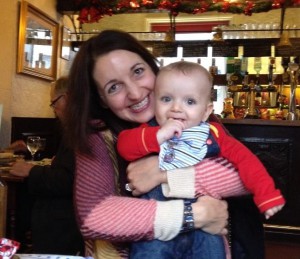 If we are honest, it really isn’t possible to enjoy every moment of parenting.
If we are honest, it really isn’t possible to enjoy every moment of parenting.
Another bad night’s sleep, a tantrum in the park, or frantically rushing between home and work is hardly the stuff family dreams are made of. It’s perfectly natural that we don’t — and can’t — spend every moment basking in how blessed we are by our children.
I know that I am so lucky to be a parent, and my days are peppered with gratitude as I watch my son laugh, play or sleep: ordinary magic moments which make me so thankful. But of course, I can also get lost in the stuff that surrounds and is part of being a mother, and the challenges that take my time and energy and that clutter our day-to-day lives.
Family life is busy. It throws curve balls. And sometimes I can lose sight of who I am and what is most important. I get stressed. I feel tired. I become impatient. Difficulties and dramas come our way. It isn’t always easy, but it is normal.
Sometimes — even if just for today, perhaps because we’ve had a reminder to or maybe just because we know deep down we need it — we can let go of everything else and embrace the moments that matter. And if we do, we might just have a blindingly lovely day…
For Today
Today we’ll do things differently, today is just for you
I’ve stopped the world from spinning round, today’s about us two
We won’t rush to get dressed or clean the breakfast from your face
We’ll linger with your favorite toys and take things at your paceLet us give the shops a miss today and scrap doing the chores
Let me oblige and sing that song each time you tell me more
Let me pick you up each time you pull and ask me for a cuddle
And if I don’t attempt a million things, I won’t get in a muddleAnd when we wander out today, I won’t make you wear your hat
You can pause at every flower, say hello to every cat
If you want to, you can walk about, even though it takes us longer
And when you’re tired, I’ll scoop you up ‘cause your love makes me strongerYou’re a million kinds of precious, and though I shouldn’t need reminding
I sometimes have to stop and think, but thanks to you I’m finding
That our lives are full of magic in between the other stuff
And what you give is all I need, love really is enoughSo let us read an extra story, let us make a bit more mess
No worries that we’re running late, no calls to make, no stress
I’m going to try and see the world just like you do each day
As an exciting big adventure and a brand-new game to playFor today, my task is not to clean or wash or tidy up
It’s to chase you ‘til you laugh out loud and beg for me to stop
It’s to play the silly games you love and take you to the park
It’s to be with you ‘til evening falls and the sky outside turns darkThen I’ll carry you to bed tonight with a happy, tired yawn
And hold you close for twice as long, just like when you were born
And if sleep does not come easily, tonight I will not mind
The world can wait, I’ll stay with you until your dreams you findAnd tomorrow might be different as that’s just the way it goes
But whatever stuff life throws at us, I hope you always know
You fill our hearts up to the brim and make the dull seem new
You grow and laugh and share and love, and teach us all this too
Would you like some pictionary with your soup?
Editor’s note: This post was published originally on Oct. 25, 2008, and it continues to give timeless inspiration to parents seeking connection at meal time:
 All this talk about presence has made me re-examine some of the good, and bad, habits my family has fallen into.
All this talk about presence has made me re-examine some of the good, and bad, habits my family has fallen into.
When I was a new mom, and therefore full of boundless optimism and energy, I promised my family would never watch television during dinner. I swore that we would use that time to talk about our day, connect with each other over world events, get reaquainted with the people we lived with day to day.
Then I went to school, got a couple years of solid and consistent sleep deprivation under my belt, and had another child. His existence contributed to the growing sleep deficit — basically insuring that I can’t finish a thought, much less a sentence, most of the time.
It began with quasi-educational programming, followed by a discussion of said programming. We would watch “Mythbusters” and discuss the physics and science behind the tests they did, or “Survivorman” and discuss the problem-solving techniques he used. Sometimes we would watch “Dirty Jobs” and talk about the importance of a good, solid education.
Then it became whatever show we wanted, and the discussions stopped. Eventually I realized we were training our children to watch television over dinner. I would ladle out soup and hear, “What are we going to watch tonight?” from my daughter. This awoke the long, slumbering power mom who swore the TV would be relegated to an hour total each day, never during dinner. She woke up mad that I had let this family slide into it’s current state of disconnection through television.
So the other night, I made my family play rudimentary Pictionary while we ate.
It was a huge success. We all drew a picture of something, movie, book or thing and let each person guess what it was. Most of the meal was spent laughing at each other’s renderings and misunderstandings. When dinner was over, there was a small pile of “art” on the table and a sense of reconnect in the family — one we hadn’t felt in a while.
We are still exhausted and crazed, and I am transitioning from stay-at-home mom to work-from-home mom, so I am sure there will be days when we slip back into our bad TV habits. However, I am hoping we can toss in more days of board games and conversation, allowing us to reconnect with each other and be more present in each others’ lives. I am also going to encourage a return to educational television during dinner, followed by a discussion, as that allows a similar connection to occur on days when TV seems like the right answer.
I hope my decision appeases the power mom inside me. I hate to disappoint her too often. She has fantastic, if sometimes somewhat unrealistic, goals.
What presence means to me
Editor’s note: This post was originally published on Oct. 24, 2008, but it echoes a sentiment many Attachment Parenting parents have heard from well-meaning friends, family members and even strangers to take some time away from our infants and toddlers, without realizing that ample presence with our children may be exactly what gives us balance.
By Christina Geyer of An American Expat in Deutschland and Mamas Worldwide
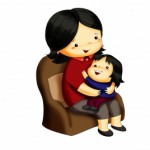 I can’t count the number of times that someone has told me that I need to get out of the house without my son.
I can’t count the number of times that someone has told me that I need to get out of the house without my son.
I’ve been told to get a regular babysitter or to put him in daycare, so that I can have time for myself. While I agree that moms do need time to themselves — I like to de-stress in a long bath with a book by my side once a week, and go to dinner and a movie with friends occasionally — I am happy to share my life with my 15-month-old son.
What does giving him my presence mean to me? It means allowing him to be present in my everyday life.
I am a stay-at-home mom. We are extended breastfeeding and cosleeping. We’re in playgroups — a German-speaking one and an English-speaking one. I also take him with me when I go to town, to the store, even to the doctor’s office, when possible. He joins me when I get a massage, sitting below the table, playing with blocks, smiling up at me every few minutes.
We eat at restaurants together. He doesn’t have a high chair with a tray, he sits right at the table with us, taking part in the family meal. I’m thankful that most places here in Germany, where we live, are kid-friendly. He loves to flirt with the waitresses, and he even tries to pay the bill.
By including my son in my everyday life, I feel I’m teaching him how to interact. He doesn’t act out like some children I’ve seen out, especially at restaurants. He sits and watches the faces of everyone around him. He laughs when we laugh and tries to eat like we eat. He happily eats sushi, caviar, all sorts of vegetables, octopus, mussels…all without even needing a bib. My friends invite us over to dinner so that their children will try new foods. They’ll say, “Look, the little guy likes it. Why don’t you give it a try?”
Now I know that some of this is just his easy-going personality and that we might have to peel spaghetti off the ceiling with our next child, but I think part of it is due to my, and my husband’s, willingness to share practically our whole lives with him. We love his company, and I think that this will help him to grow up loving our company as well.
Using presence to raise independent children
Editor’s note: This post was originally published on Oct. 22, 2008, but it carries a timeless message of the payoffs of giving presence to our children, allowing them to develop independence on their own developmental timeline.
By Kayris Wall of The Great Walls of Baltimore and Mommy, What’s For Dinner?
 One day, when my son was a baby, I took him to the grocery store. He started to cry, and as I lifted him out of his car seat, a strange woman walked by. “If you do that every time he cries, he’ll never learn to be independent,” she said over her shoulder.
One day, when my son was a baby, I took him to the grocery store. He started to cry, and as I lifted him out of his car seat, a strange woman walked by. “If you do that every time he cries, he’ll never learn to be independent,” she said over her shoulder.
I was a brand-new mom and hadn’t developed my laser-like Mind Your Own Business stare yet, so I mumbled something about him being hungry. As I watched her walk away, I thought to myself, Is she kidding? He’s only 2 months old. He’s not supposed to be independent!
That baby just turned 4 years old recently, and has been joined by a sister, now almost 2 years old. Sometimes I still think about that stranger in the grocery store. I wish I would run into her again so I could show her my independent, friendly, confident little boy and tell her, “See this? It’s because I’ve always been there for him.”
I’m not claiming to be a perfect parent by any means. I have my strengths and my many, many weaknesses. The most difficult one by far is controlling my quick temper and being patient instead. It’s something I struggle with daily. But if there is one thing that I’m absolutely confident that I’m doing right, it’s that my children know that I’m there for them when they need me.
Until recently, I was primarily a stay-at-home mom. In the beginning, I provided the most basic needs to my infant son. I breastfed him when he was hungry, changed him when he was wet, rocked him to sleep when he was tired. I spent hours just holding him, and he went everywhere with me. It was fun. He was my little buddy. Two years later, our duo expanded when I had another baby, and my son was always there when I nursed, rocked and changed his sister.
Sometimes it was lonely and I felt isolated a lot, but seeing the end result makes it worth it. Beyond feeding and changing and snuggling, I was there when my son brought me an acorn and asked, “What’s this thing?” I was there to bandage their wounds when they fell, help them learn to climb steps, to tie shoes and wipe noses. There were a lot of times when they didn’t need me, but I was there on the sidelines in a benign fashion, just in case they did. When they are grown and look back to the early years of their lives, I hope they’ll always see my presence, even if it’s just as a shadowy figure around the outskirts.
In the past year, I picked up some daytime hours at my part-time job. While I’m working, my mom stays with my children. This past September, my son started preschool three days a week. Both transitions went smoothly; in fact, the separation was harder on me than it was on my kids! But I am convinced that these first years, those times in which I was never far away, helped shape them into independent, adaptable little people and that is why they were just fine was I was suddenly not there. They knew that I would come back.
I’m not advocating that all mothers quit their jobs to become stay-at-home parents. I enjoy my time away, I’m good at my job, and I like what I do. And as my children grow and parenting them becomes more complex, I find that working outside of the home helps make me a better parent. This is partly because I can interact with other adults and gain perspective from other parents, but also because the time that I do have with them is that much more precious. It makes it that much easier to put aside my to-do list and to focus 100% of my attention on them.
My son is thriving in school, and I’m so impressed with the program he is in that I may sign my daughter up for the 3-year-old program next fall. Eventually, both will be in school full time, both will make friends, play sports and not need my presence in the same way that they do now. But it’s okay, because they will both be prepared to go out into the world, knowing that they are loved and cherished. They will be ready. And I will be ready, too.

